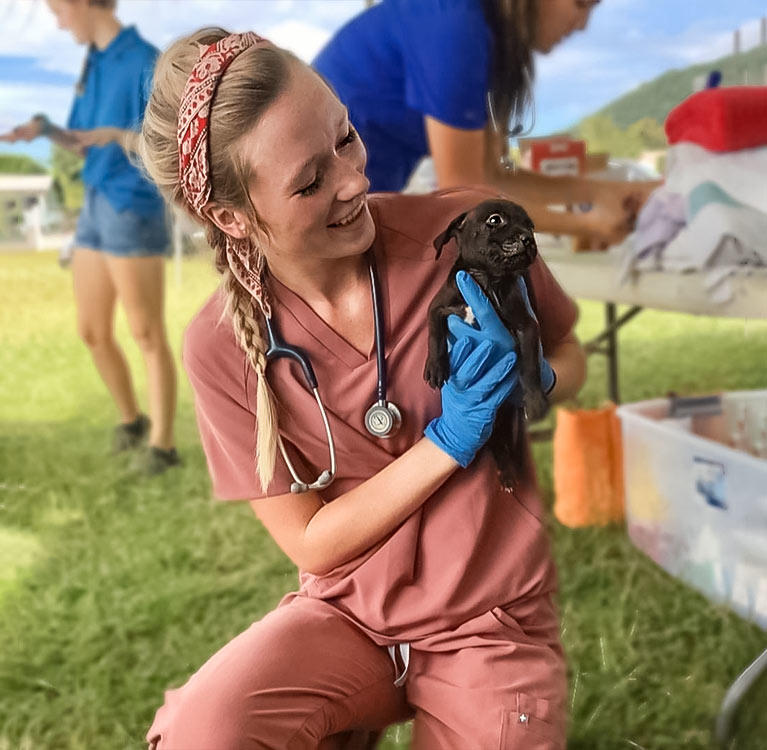Are you considering a career in veterinary medicine? Maybe you are wondering how to get into vet school, or what classes you need to take as an undergrad?
Admission to a college of veterinary medicine requires planning and good record-keeping. Vet school requirements include prerequisite classes, experience with animals, tests, and recommendations from mentors who have knowledge of not only your ability to do well in school but also of your ability and desire to care for animals.
In this blog, we’ll take a deeper dive into veterinary school requirements, what you can do to prepare for and make your application stand out, and what college classes you’ll need to get into vet school.
VET SCHOOL COURSE REQUIREMENTS
Specific vet school requirements vary from program to program, but almost all vet schools require undergrad courses, standardized testing, recommendations, experience with animals, and the reason why they should admit you to their highly competitive veterinary medicine program.
You may be wondering what classes do you need to get into vet school. Vet school requirements typically include college-level math and science courses, such as biochemistry, biology, physics, and statistics, as well as English and social sciences.
Some schools require a full bachelor’s degree, or even upper-level biomedical science courses, such as animal nutrition, microbiology, or physiology. Some schools will allow AP courses to meet the requirements as long as they are listed on the official college transcript.
We’re going to look at the general requirements to get you started on the path to an exceptional vet school application.
UNDERGRADUATE EDUCATION
The best undergrad for vet school is the one that has all the school’s prerequisite course requirements. Most applicants to vet school have completed four years of undergraduate education. However, depending on the program to which you are applying, you may be eligible for admission after only 2 to 3 years of college courses, as long as you have met the prereqs for vet school.
A 4.0 undergraduate GPA may not be required, but vet school admission is competitive so you’ll want to make sure you are meeting the minimum GPA requirement required by your top school picks.
THE GRADUATE RECORD EXAMINATION
The Graduate Record Examination® (GRE®) is a standardized test for undergraduates who are considering a higher education degree. The GRE tests your ability to understand and analyze written materials, apply critical thinking skills, analyze ideas or arguments, and use basic math skills to solve problems and analyze data.
Some veterinary schools require alternate or additional tests, such as one of the GRE subject tests or the Medical College Admission Test® (MCAT®). Most schools require admissions tests to be taken within 5 years of applying to vet school.
DOCUMENTED ANIMAL CARE EXPERIENCE
Caring for your family dog was an education in patience, persistence, love, and sometimes heartbreak. Unfortunately, this experience doesn’t count in the eyes of the vet school admissions board.
Vet schools look for applicants who have varied experiences with animals while under professional supervision. While shadowing a Doctor of Veterinary Medicine (DVM) or working at a vet clinic are top-notch experiences, animal work in other settings count too. The local zoo, 4-H animal projects, animal farms, the SPCA, and kennels all provide opportunities to learn about animals.
As soon as you consider veterinary school as a future option, start documenting your animal care experience. Most vet schools require this documentation and they may ask for a minimum number of animal experience hours.
LETTERS OF RECOMMENDATION
Most vet schools require at least one letter of recommendation. While letters from college professors highlight your ability to perform well in a classroom or lab, a letter from a supervising DVM will make you stand out and may be required or recommended for admission.
Recommendations can come from anyone who has supervised your work with animals. Don’t forget volunteer work or even animal research positions.
THE ESSAY
Vet schools typically require at least one personal essay or statement as part of the application. Your personal statement should be an honest look at your journey and why you want to be a vet. Be passionate and sincere. The admissions committee should feel like they are getting to know you and what drives your desire to be a vet.
PREPARING FOR VET SCHOOL
As we’ve seen, vet school requirements demand planning. As soon as you decide you want to become a veterinarian, start developing a roadmap to vet school.
If this revelation comes during high school, ask your guidance counselor to help you create an academic program that will prepare you to take the rigorous college courses you’ll need to qualify for vet school admission. Some vet schools, but not all, allow AP courses to satisfy their prereqs.
Keep your grades up. While vet schools won’t look at your high school GPA, your undergraduate college will. Show the college admissions committee that you are prepared to take the math and science courses required for vet school admission. Develop solid work and study habits.
As you continue your journey in an undergraduate program, touch base with your college counselor to ensure you are on track to meet the prerequisites required for vet school.
Seek out leadership positions. Vet schools desire well-rounded students who aren’t afraid to lead. Join clubs and activities that you enjoy, and then shoot for those leadership positions.
Gain animal care experience. The secret here is getting a variety of experiences under your belt by the time you apply to vet school. Working or volunteering under a DVM is very important to vet schools, but other settings are also valuable learning experiences, such as at your local SPCA, a zoo, or 4-H animal projects.
Consider shadowing several DVMs in different settings, such as a large animal clinic, a small animal clinic, or a zoo. A variety of veterinary care experiences will serve to not only impress the admissions committee but ensure that you are choosing the correct career path for you.
Document your animal experiences. Keep track of all animal care activities performed, along with dates, the number of hours worked, and the names and contact information of your supervisors. Experiences can be paid or volunteer work, or shadowing hours. Be sure to include the skills you developed and what each experience taught you, such as responsibility, a strong work ethic, or communication skills.
Ross Vet provides an accelerated, broad-based curriculum that integrates unique research opportunities, classroom study, and hands-on clinical training. Take the next step on your path to becoming a veterinarian. Apply for admission to Ross Vet today.
Related Links:






